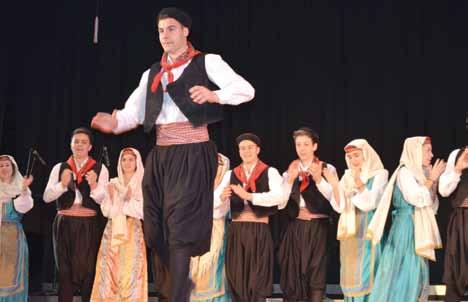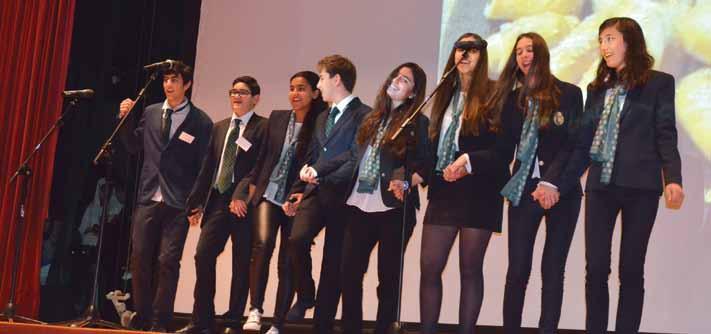
3 minute read
Smyrna (Part VII) The ‘Cousins’ meet again
ThE ‘cousins’ MEET again
Greek students performing their traditional dance at the Founder’s Day Reunion
Once again, the ‘cousins’ meet. This time the venue was PIERCE – the American College of Greece. One after the other, school administrators – with students in tow – arrived to the campus in February to attend a three-day Founder’s Day Reunion. There was much ado. After all, this is only the second time the schools meet after a 77 year separation. The first reunion was held a year ago, in Izmir – IC’s birthplace. And once again, everyone was amazed that all shared the same ‘spirit’.
The President of the American College of Sofia, Dr Peter Johnson, couldn’t help commenting on it. “I am really struck by the familiarity of everything,” he said. “The pictures, our stories, our students, everything.”
Of course, explained Alison Stendahl, one of the attendees, “this is the spirit that was handed down from generation to generation,” she said. “You are all the children of the same founding fathers.”
Those founding fathers were none other than the ABCFM (the American Board Commissioners for Foreign Missions) - Protestant missionaries who established schools and universities throughout the region in the 1800s. Stendahl is the last member of that Board. In Turkey, since 1980, she is now the sole remnant of an all-encompassing undertaking begun by two Protestant missionaries, Reverends Levi Parsons and Pliny Fisk, in 1820. Her retirement, this year, marks the end of that mission.
“Look for the things in common,” she continued. “You will find many, many things in common and very little which will make you different.”
It didn’t take long for the ‘cousins’ to find those things in common. Greek, Turkish and Lebanese students took to one another as school administrators were left to mingle and compare notes.
Out of the 15 schools that were originally established by the Board, only seven schools survive today: International College (Beirut), American Collegiate Institute (Izmir), Anatolia College (Greece), Pierce (The American College of Greece), Tarsus American College, Uskudar American Academy (Turkey) and the American College of Sofia.
Eight students from IC (Ain Aar) accompanied by music teacher, Arlette Akl and IC Newsletter writer, Reem Haddad, attended the reunion in Athens. For the next three days, students held debates and gave presentations about their schools. IC’s students also gave a little ‘extra’ performance by reciting Lebanese proverbs and performing a Fairuz song. “They (the founders) are not with us anymore,” said PIERCE President Dr. David Horner, “but I am sure that they are proud their children are together today.”
Indeed, these kinds of gatherings were probably common in the 1800s. But their lives were shattered by the many troubles that came to the area. The Ottoman Empire’s demise led for a struggle for Turkish self-determination and schools were subjected to heavy restrictions. The role of ABCFM and its missionaries dwindled considerably. With the establishment of the Turkish Republic in 1923 and the US depression in 1929, some of the Board’s schools eventually either shut down permanently or relocated to other countries, as in IC’s case. Some, however, remained.
Only those that remained retained some link with the Board. Others, like IC, went on to form their own independent secular boards.
As the years passed and as they adapted to their new environments, the schools lost touch with one another.
“We are indeed cousins,” said Olga Julius, the Principal of PIERCE College. “We were all founded by the same visionaries who set out to change the world. It is up to us to continue with this mission.”
IC students, who had just become aware of their school’s rich history,
seemed to be in awe themselves.
“It’s like we are one big family, isn’t it?” said Adriana Zraick, 14.
Sam Kebbe, 14, agreed.“I never knew about our heritage,” he said. “It’s really important.”
In only a few hours and judging by the photos, students managed to secure lifelong friends among their Greek and Turkish counterparts.
“It was really interesting to see our cultures mix,” said Anthony Flouty, 14.
But most important, the new generation of ‘cousins’ vowed to keep in touch. “We are now all Facebook friends,” said Estelle Raphael, 14. “I can’t wait for them to visit us at IC.”

The ‘cousins’: Lebanese, Greek and Turkish students


